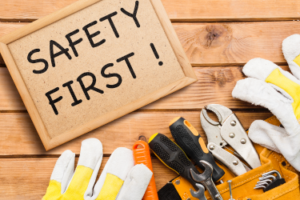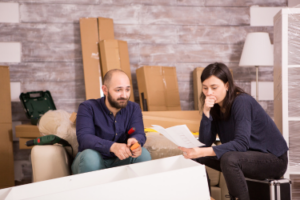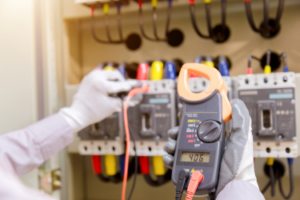Are you responsible for running a block of flats, either as a landlord or as part of a management company?
If you are, ensuring the safety and security of both the property itself and the tenants within, will be a priority. How do you reduce the risk of an unwanted intruder entering the block? How do you minimise thefts from communal spaces or car parking areas? What can you do to balance free access and security for your tenants? Let’s have a look at three areas where you can make a big difference.
The big three: CCTV, access control and alarms
The nature of a block of flats means there is no single security solution. Each must be tailored to the physical layout of the flats, and the needs and expectations of the residents. Three major areas of apartment block security are; are CCTV, alarms, and access control. CCTV provides a proactive deterrent and a way of gathering evidence, should a prosecution be required. Alarms provide a second line of deterrent, reacting to unauthorised entry for example. Effective access control ensures that people only access the areas to which they are authorised, be that individual flats, communal spaces or car parking.
CCTV – the front line in deterring potential crime
The first aim of a security solution is to deter criminals from even trying. If you can make your flats look secure, you can deter more than 90% of thieves from even trying to break in, or vandals from wanting to cause damage. Criminals want a soft target and a low chance of being caught. CCTV cameras play a big part in deterring crime. The right combination of active, passive and decoy cameras, strategically placed to provide effective but not intrusive coverage, will have a major impact on reducing attempted criminal activity. It will also increase the satisfaction of your tenants and desirability of the flats themselves.
For every 100 crimes 16 are prevented due to CCTV
Source: College of Policing
CCTV coverage should include not only main entrances, but also car parks, stairs and lifts, outbuildings as well as the perimeter of the complex. As multiple people may have their images and movement data captured, you will need to have an appropriate management system to control the use of CCTV footage, in line with the Data Protection Act of 2018. Such a system should be planned at the time the CCTV is installed and will include things like data retention periods, who can request to see CCTV footage, how they will apply and how the security of the footage will be ensured.
Access control – the right people in the right place
The second line of protection for a block of flats is comprehensive access control, allowing authorised support staff and tenants ease of access whilst protecting against unauthorised intruders. Traditional lock and key solutions still have a place, however it can be difficult to keep track of physical keys and prevent duplicates being made, even when restricted key blanks are used. Locks with pass keys also provide less protection due to the nature of their construction.
Increasingly, electronic keys, either in the form of a passkey or fob, offer controlled and flexible access, with the ability to remove keys if one is lost or stolen. Data can also be kept as to which key has been used to access a given area at any time. Electronic access solutions can combine car parking, communal areas, shared facilities, as well as individual flats, if required. Keypad access can be used, however the issue of a code becoming well-known can be problematic.
Some rental residents might prefer a physical key to control access to the front door of their flat and this should certainly be considered as part of an overall access strategy. Lock cylinders can be changed at the end of a tenancy to ensure security is maintained. Where the flat is owned rather than rented, the owner is likely to value the option of either a physical or electronic key-based entry.
Access control in the case of fire is also important. Exit doors fitted with a panic exit device, such as the horizontal door release, need to be reviewed to ensure that exit is easy (no instructions required) in the event of a fire. It is important to ensure that their use for unauthorised entry is difficult, for example checking that an intruder cannot simply break a pane of glass to operate the mechanism. Where an electronic solution, such as a ‘push to open’ button, fire regulations for rental properties need to be followed to allow safe exit in the case of power failure.
Alarms – deterring and detecting crime
Where CCTV has failed as a deterrent an alarm system will help both deter and detect crimes. Alarms work well to both protect individual flats as well as storage and maintenance areas. A good alarm system should be visible too, so that it acts as another line of deterrent. Importantly, you should consider what you wish the alarm to do once triggered. An audible-only alarm, often used on individual houses, may not be the most suitable for multiple tenancy buildings. Is responding to a triggered alarm, part of the managed service offered in your flats? If so, who will respond and in what timescale? What will the response involve?
Alarms systems can be used to signal other issues too. Fire is the most obvious, but carbon monoxide monitoring or calling for help, if assisted living is offered can also be included. Ensuring that alarm systems are properly maintained is important, not just for reasons of effectiveness, but this is likely to be a requirement for insurance purposes.
What to do next?
Ensuring the security of your block of flats is important, both for you and your residents. Providing the right protection involves careful planning, installation, and management. Dependable Limited hopes that your property is never targeted, but having a building with a high level of security to start with can be the difference, as necessary equipment can be a deterrent for many criminals. If securing your building is something you haven’t done yet, or you want to make improvements to an existing system, make sure to get in touch.




